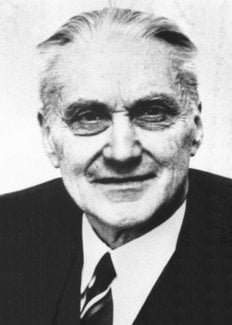Ragnar Frisch
Biographical

I was born in Oslo, March 3, 1895, as son of the gold- and silversmith, Anton Frisch, and his wife, Ragna Fredrikke Kittilsen, who has had a great impact on my general outlook and view on life.
I was first married in 1920 to Marie Smedal. We had an only child, Ragna, who was married Hasnaoui. She has a daughter, Nadia, who, of course, in the view of her grandfather, is the most superb granddaughter in the whole world. My first wife died in 1952. In 1953, I married Astrid Johannessen whom I had known from childhood. She had passed her university degree in languages in the Oslo University, 1921. She is a daughter of the businessman and shipowner (from the time of the sailing ships), I.M. Johannessen and his wife, Julie Caspersen. They had been intimate friends of my parents for many years. Ever since our marriage, Astrid has been my unfailing companion and has sustained me devotedly in all the ups and downs of life.
My father’s gold- and silverwork firm in Oslo was established by my grandfather in 1856. Gold and silver has been a tradition in our family ever since the years around 1630 when King Christian IV of Denmark-Norway asked the Electoral Prince of Saxony to send him a team of mining specialists from Freiberg in Saxony (that had a Mining Academy) to the newly-discovered silver deposits at Kongsberg, Norway. We can trace our ancestry fairly exactly back to that time.
When I was planning my future it was more or less taken for granted that I should follow the gold and silver tradition. For that purpose, I started as an apprentice in the workshop of the famous Oslo firm, David Andersen, and at the end of the apprenticeship in 1920, I completed my handicraftsman’s probation work as a goldsmith.
After the beginning of my apprenticeship, my mother got a strong feeling that the trade would not be satisfactory for me in the long run. She insisted that at the same time as I completed my apprenticeship, I should take up a university study. We perused the catalogue of the Oslo University and found that economics was the shortest and easiest study. So, therefore, economics it became. That is the way it happened. Later on, the study of economics in the Oslo University has proceeded by leaps and bounds in the direction of a more advanced and time-consuming study (some people seem to think that, somehow, I have been instrumental in this development).
I passed my university degree in economics in Oslo, 1919. About a year later, I went abroad to study economics and mathematics in earnest. I visited France, Germany, Great Britain, the United States and Italy. During my stay of nearly three years in France, I got so familiar with the conditions there that ever since, when I get to visit France, I somehow feel that I have “come home again”. I passed my Ph.D. on a mathematical statistical subject in the Oslo University in 1926. In 1925 I was appointed Assistant Professor, in 1928, Associate Professor, and in 1931, full Professor in Oslo. I became Director of Research of the newly-established Economic Institute in the Oslo University.
In addition to these facts, I shall not have much to say about my scientific career. I am an invited member of a great number of learned societies in different countries, and have several doctorates honoris causa.
Of my scientific awards before the 1969 Prize in Economic Science in Memory of Alfred Nobel, I must mention the big Antonio Feltrinelli prize awarded to me in 1961 by the Accademia Nazionale dei Lincei, the old and famous Italian society of which Galileo Galilei was one of the first members.
When I think of the long list of problems of which I have in vain tried to find the solution, and think of the honours that have nevertheless been bestowed upon me, I understand with deep thankfulness to Whom all this is due: to the Lord Who has steered my steps over the years, and Who has been my refuge in the superior matters which no science can ever reach.
My hobbies have been outdoor life, including mountain climbing on a modest scale. But above all, it has been bee-keeping and queen-rearing in which I have been engaged for 57 years, with emphasis on a genetic and statistical study with a view to improving the quality of the bee. If somebody asked me if I find this occupation pleasant and entertaining, I am not sure I could honestly say yes. It is more in the nature of an obsession which I shall never be able to get rid of.
This autobiography/biography was written at the time of the award and first published in the book series Les Prix Nobel. It was later edited and republished in Nobel Lectures. To cite this document, always state the source as shown above.
Ragnar Frisch died on January 31, 1973.
